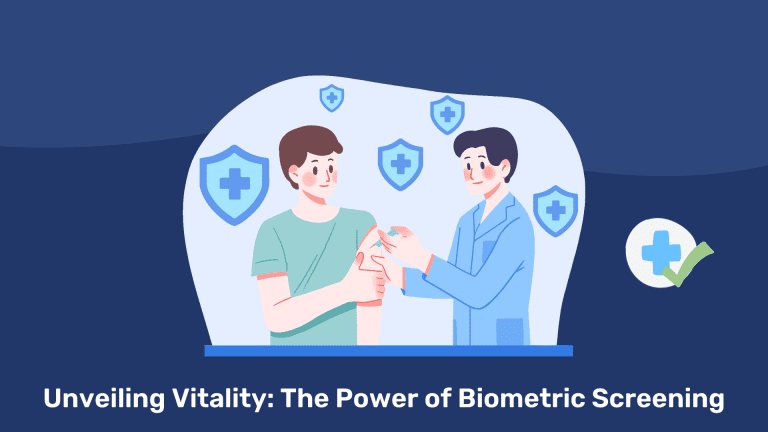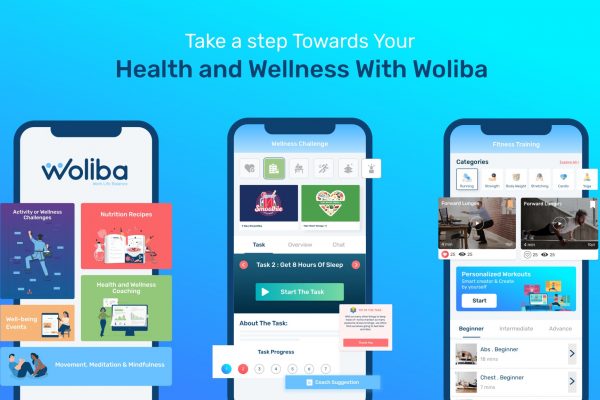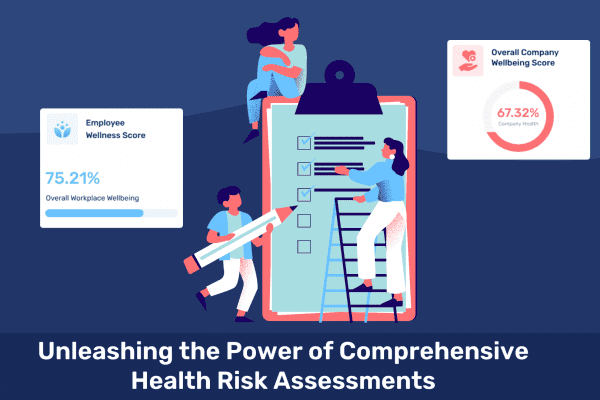Introduction
Imagine a world where your body could tell you its secrets, where a simple scan could unlock a treasure trove of information about your well-being. Well, guess what? That world is already here, and it’s called biometric screening. Yep, you heard me right. It’s like giving your body a voice, and it’s a game-changer in the realm of preventive healthcare.
Suppose you stroll into a clinic, not for a mundane checkup, but for a cutting-edge experience that reveals more about your health than you ever thought possible. According to the Centers for Disease Control and Prevention (CDC), chronic diseases like heart disease, stroke, diabetes, and cancer account for a staggering 7 out of every 10 deaths in the United States. Now, take a deep breath, because here’s the kicker: up to 80% of these deaths are preventable through lifestyle changes and early detection.
Think about it – wouldn’t it be awesome to catch a potential health issue before it even raises its head? Biometric screening is like a superhero that can predict your body’s next moves. It’s not about crystal balls and magic potions; it’s about hard science and data-driven insights that could save your life.
So, buckle up, curious reader, because in this journey, we’ll delve into the nitty-gritty of biometric health screening. We’ll explore how it works, what it can reveal, and why you should care – all while keeping it as engaging and informative as your favorite coffee shop chat. Get ready to unlock the secrets your body’s been holding onto – let’s dive in!
The Challenges of Skipping Health Risk Assessments (HRA) for Employers
In today’s fast-paced corporate landscape, ensuring the well-being of employees isn’t just a responsibility – it’s a strategic imperative. Health Risk Assessment (HRA) serves as a vital tool in this endeavor, allowing employers to gauge and address potential health risks among their workforce. At the heart of a comprehensive HRA lies biometric screening, a cornerstone element that provides invaluable insights into employees’ health profiles. Here’s why overlooking this component can lead to significant challenges for employers:
- Incomplete Health Profile
- Missed Early Detection
- Limited Health Promotion Opportunities
- Inefficient Resource Allocation
- Impact on Productivity
- Neglected Employee Engagement
In essence, biometric screening, as an integral part of HRA, empowers employers to make informed decisions, tailor wellness programs, and create a culture of well-being. By embracing this proactive approach, employers can tackle health challenges head-on, resulting in a healthier, happier, and more productive workforce.
What is a Biometric Screening?
Biometric screening is a systematic and non-invasive process designed to assess an individual’s health status by collecting and analyzing various physiological measurements and health indicators. These measurements are often objective and quantifiable, providing valuable insights into an individual’s overall health, potential risks, and areas that may require intervention or lifestyle adjustments.
In workplaces and community health settings, biometric health screening plays a pivotal role in promoting preventive care, identifying potential health issues at an early stage, and fostering a culture of well-being. By combining data-driven insights with personalized guidance, biometric health screening transforms health assessment into a proactive and holistic approach, ensuring better health outcomes for individuals and communities alike.
What is included in a Biometric Screening?
This screening method involves the measurement and analysis of key biometric markers, such as:
- Blood Pressure: Evaluates the force of blood against arterial walls, indicating cardiovascular health and potential risks of hypertension or heart disease.
- Cholesterol Levels: Assesses levels of LDL (bad) cholesterol and HDL (good) cholesterol, offering insights into heart health and potential risk of atherosclerosis.
- Blood Glucose Levels: Measures the amount of sugar in the blood, helping to identify diabetes or pre-diabetic conditions.
- Body Mass Index (BMI): Calculates the ratio of weight to height, indicating whether an individual is underweight, normal weight, overweight, or obese.
- Waist Circumference: Measures abdominal fat, which is linked to an increased risk of heart disease, diabetes, and other metabolic conditions.
- Body Composition: Analyzes the proportions of muscle, fat, water, and bone in the body, aiding in understanding overall fitness and potential health risks.
- Resting Heart Rate: Reflects cardiovascular fitness and can provide insights into stress levels and overall heart health.
- Health Questionnaires: Often included alongside biometric measurements, these questionnaires gather information on medical history, lifestyle habits, and family health history.
The data collected from biometric health screening to assess an individual’s health risks, create personalized wellness plans, and tailor interventions to address specific health needs. This information empowers both individuals and healthcare professionals to make informed decisions about lifestyle modifications, early intervention, and targeted health improvements.
What are Healthy Biometric Values?
Healthy biometric values can vary based on factors such as age, gender, and individual health conditions. However, there are general ranges for some key biometric measurements that are often assessed in health screenings. Keep in mind that these values are approximate and may vary slightly based on different sources and guidelines:
| Normal | Elevated | Hypertension Stage 1 | Hypertension Stage 2 | |
| Blood Pressure | Less than 120/80 mm Hg | 120-129/80 mm Hg | 130-139/80-89 mm Hg | 140/90 mm Hg or higher |
| Total Cholesterol | LDL (Bad) Cholesterol | HDL (Good) Cholesterol | Triglycerides | |
| Cholesterol Levels (milligrams per deciliter, mg/dL) | Less than 200 mg/dL | Less than 100 mg/dL | 60 mg/dL or higher | Less than 150 mg/dL |
| Fasting Blood Glucose | Prediabetes | Diabetes | |
| Blood Glucose (milligrams per deciliter, mg/dL) | Less than 100 mg/dL | 100-125 mg/dL | 126 mg/dL or higher |
| Normal Weight | Overweight | Obesity | |
| Body Mass Index (BMI) | BMI 18.5-24.9 | BMI 25-29.9 | BMI 30 or higher |
| Men | Women | |
| Waist Circumference | Less than 40 inches (102 cm) | Less than 35 inches (88 cm) |
| Adults | |
| Resting Heart Rate | 60-100 beats per minute |
Benefits of Biometric Screening
Biometric health screening isn’t just a buzzword – it’s a powerful tool that offers a multitude of benefits for individuals, employers, and healthcare providers alike. Let’s dive into how this cutting-edge approach to health assessment can revolutionize well-being:
-
Early Detection and Prevention:
Biometric screening acts as a healthy “early warning system,” detecting potential risks before they escalate into serious conditions. By identifying issues like high blood pressure, elevated cholesterol, or abnormal blood sugar levels early on, individuals can take proactive steps to prevent chronic diseases like heart disease, diabetes, and more.
-
Personalized Insights:
No two bodies are the same, and biometric health screening recognizes that. It provides personalized insights into an individual’s unique health profile, enabling targeted interventions and wellness plans that cater to specific needs, lifestyles, and goals.
-
Informed Decision-Making:
Armed with accurate and objective health data, individuals can make informed decisions about their lifestyle choices. From dietary adjustments to exercise routines, biometric health screening empowers individuals to take control of their well-being.
-
Tailored Wellness Programs:
Employers can leverage biometric health screening to design wellness programs that are truly effective. With a deeper understanding of their workforce’s health risks, employers can create targeted initiatives, workshops, and incentives that promote healthier habits and reduce healthcare costs.
-
Cost Savings:
Preventive care is often more cost-effective than treating advanced health issues. Biometric health screening helps identify potential problems early, reducing the need for costly medical interventions, hospitalizations, and long-term treatments.
-
Healthcare Resource Allocation:
Healthcare providers can optimize their resources by focusing on individuals who require immediate attention or intervention. This ensures that healthcare efforts are directed where they are most needed.
-
Measurable Progress:
Biometric health screening provides a baseline for health assessment, allowing individuals to track their progress over time. Witnessing positive changes in biometric markers can be motivating and rewarding, encouraging individuals to stick with their wellness routines.
-
Employee Engagement and Satisfaction:
For employers, offering biometric health screening as part of workplace wellness programs demonstrates a genuine commitment to employee well-being. This can boost employee morale, job satisfaction, and overall engagement.
-
Community Health Initiatives:
Biometric health screening can be a cornerstone of community health initiatives, reaching a broader population and driving collective efforts toward healthier lifestyles.
-
Data-Driven Insights:
The data collected from biometric health screening contributes to a broader understanding of population health trends, enabling public health organizations and researchers to make informed policy decisions and develop targeted interventions.
In a world where health is wealth, biometric screening opens doors to a future where prevention, personalized care, and well-being are at the forefront. By harnessing the power of data and technology, biometric health screening is transforming how we approach health assessment, making healthier lives a tangible and achievable reality.
How to Do Biometric Screening?
Performing a biometric screening involves a series of measurements and assessments to gather objective data about an individual’s health. While professional healthcare providers often conduct comprehensive biometric screenings, here’s an overview of the steps you can expect and how to prepare:
-
Choose a Provider:
You can schedule a biometric screening through your healthcare provider, workplace wellness program, community health fair, or a specialized screening event. Make sure to check what measurements and assessments will be included.
-
Schedule an Appointment:
If required, schedule an appointment for the biometric screening. Follow any pre-screening instructions provided by the provider, such as fasting before the blood test.
-
Preparing for the Screening:
- Wear loose-fitting clothing to allow for easy measurements.
- Avoid heavy meals, alcohol, and caffeine before the screening, especially if fasting is required.
- Bring any necessary identification and insurance information.
-
The Screening Process:
The biometric screening may include the following measurements and assessments:
- Blood Pressure Measurement: A cuff is placed around your arm to measure your blood pressure.
- Cholesterol Levels: A blood sample is taken to assess total cholesterol, HDL (good) cholesterol, LDL (bad) cholesterol, and triglycerides.
- Blood Glucose Testing: Another blood sample is taken to measure blood sugar levels.
- Body Measurements: Height, weight, and possibly waist circumference are measured.
- Body Composition Analysis: Some screenings may include a body composition analysis, often done using bioelectrical impedance or other methods.
- Resting Heart Rate: Your heart rate is measured while you’re at rest.
-
Health Questionnaire:
You may be asked to complete a health questionnaire that covers medical history, lifestyle habits, and family health history.
-
Interpretation and Counseling:
After the screening, a healthcare professional may discuss your results with you. They can help you understand what the measurements mean, identify potential health risks, and provide guidance on improving your health.
-
Follow-Up:
Based on your results, you might be advised to follow up with your primary care physician or a specialist for further evaluation or treatment if necessary.
-
Maintaining Health:
Use the information from the biometric screening to make informed decisions about your lifestyle, diet, and exercise habits. Consider setting health goals and working with healthcare professionals to develop a plan for improvement.
Remember, the specific process may vary based on the provider and the purpose of the screening. For the most accurate and personalized information, consult with the professionals conducting the screening. Biometric screenings can be valuable tools in promoting preventive care and understanding your health status, ultimately contributing to your overall well-being.
Conclusion
In a world where proactive health management is key, biometric screenings have emerged as essential tools for unlocking insights into our well-being. By measuring critical indicators such as blood pressure, cholesterol levels, blood glucose, and body composition, these screenings offer a window into our health status, helping us identify potential risks early on.
Armed with this knowledge, we can take charge of our health, make informed lifestyle choices, and collaborate with healthcare professionals to create personalized wellness plans. The data-driven approach of biometric screenings empowers us to embark on journeys towards improved health, greater vitality, and a brighter future.
Woliba stands at the forefront of holistic well-being with its comprehensive Health Risk Assessment (HRA) and biometric screening solutions. Through Woliba’s platform, individuals gain access to thorough biometric screenings that include measurements of blood pressure, cholesterol, blood glucose, and more. Our HRA seamlessly integrates these data points, providing a comprehensive health profile.
In a world where well-being is a priority, Woliba’s commitment to comprehensive HRA and biometric screening shines as a beacon of health empowerment, enabling individuals to embrace their health journeys with confidence, knowledge, and vitality. Contact us now for your personalized health journey.



